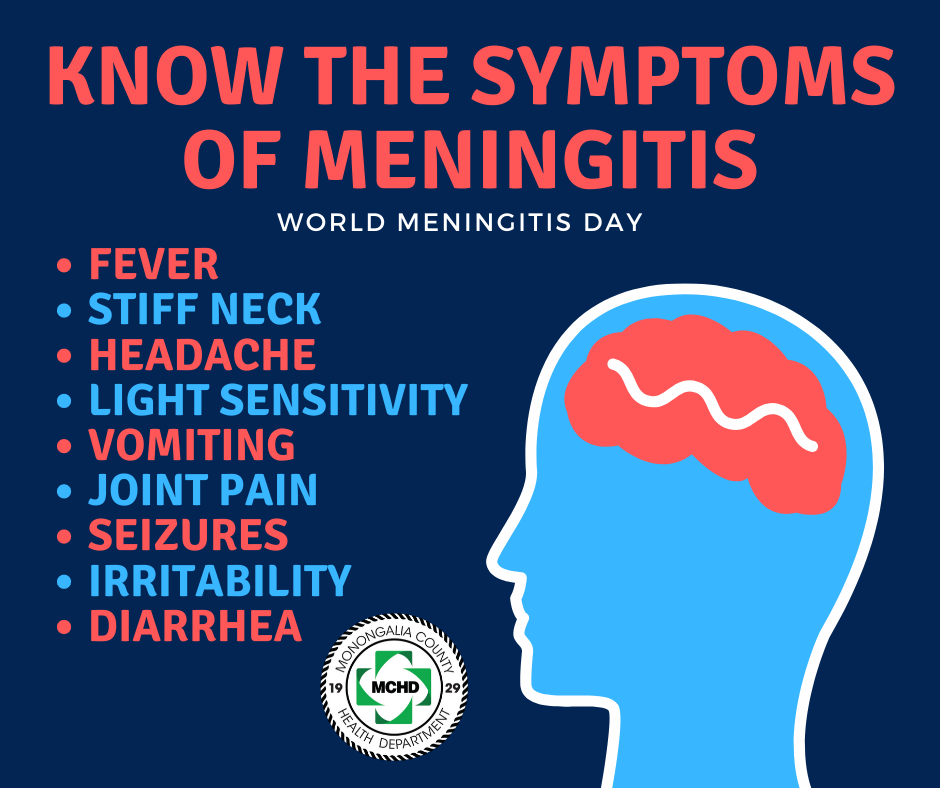Got kids? Learn more about meningitis, which actually can strike anybody.

Apr. 21, 2020
By Kenzie Bostick
There’s a lot going on right now to think about. This one is something to ponder as school approaches in the fall — meningitis.
Friday is World Meningitis Day, so even with the ongoing COVID-19 pandemic and the fact that students aren't gathering for school, it's a good time to learn more about this illness.
Meningitis is inflammation of the membranes and fluid surrounding the spinal cord and brain, and it affects more than 1 million people each year. Children under 5 years old and adolescents between the ages of 15 and 19 are most at risk.
There are three types of meningitis: bacterial, viral and fungal or environmental. The Centers for Disease Control and Prevention offers a lot of information on meningitis. Here are some basic facts:
Of the three types, bacterial meningitis is most severe and causes nearly 170,000 deaths annually. This type develops within a few hours and can lead to death within 24-48 hours after symptoms begin. Of those who survive, there are often permanent disabilities.
Bacterial meningitis is caused by three types of bacteria: meningococcus, pneumococcus and Haemophilus Influenzae Type B (Hib). Most people already have these bacteria in their throat and nose, and most of the time they do not cause harm. These bacteria are spread through respiratory droplets.
Those who recover from bacterial meningitis can have serious after-effects or complications, such as cerebral palsy, depression, epilepsy, blindness, deafness or developmental delays in children.
Viral meningitis is the most common type of meningitis. In most cases, people take weeks or months to recover, but often do not have permanent damage. This type of meningitis is caused by viruses such as enterovirus or the mumps, which are frequently spread through respiratory droplets. The measles, mumps and rubella (MMR) vaccine can decrease chances of this type. The after-effects of this type of meningitis include balance problems, memory lapses, concentration problems and mood swings.
There are vaccines to help prevent some types of both bacterial and viral meningitis. That vaccine, along with the MMR, is available at MCHD Clinical Services, although not currently because of the COVID-19 pandemic.
Fungal or environmental meningitis can be very severe but is not very common. This type is not contagious and spreads through spores of fungus being inhaled. Meningitis can also be caused by parasites or other illnesses, such as cancer, lupus, head injuries, brain surgery or some drugs.
The symptoms of meningitis can sometimes be mistaken for those of seasonal influenza and are different depending on age group.
The symptoms of meningitis in older children and adults are the following:
● Fever
● Severe headache
● Sensitivity to light
● Vomiting
● Irritability
● Diarrhea
● Stiff neck
● Joint pain
● Seizures
The symptoms of infants are different:
● Fever
● Difficult to wake
● Vomiting
● Pale or blotchy skin
● Loss of appetite
● Irritability
In addition to vaccines, there are other preventative measures that can be taken. Smoking can increase your chances of being a carrier of meningitis bacteria and quitting can lower your risk of spreading them. Keeping surfaces clean and avoiding environments with fungal spores such as dust or bird droppings can decrease chances of viral and fungal meningitis.
So even when the COVID-19 pandemic calms down, there’s good reason to keep wiping down surfaces with a 10% bleach solution.
If you or someone you know is showing these symptoms, go to the emergency room quickly.
And, as the new school year approaches, call MCHD Clinical Services at 304-598-5119 to schedule an appointment for vaccinations to help prevent meningitis and other illnesses.
Kenzie Bostick is a public information intern at Monongalia County Health Department.